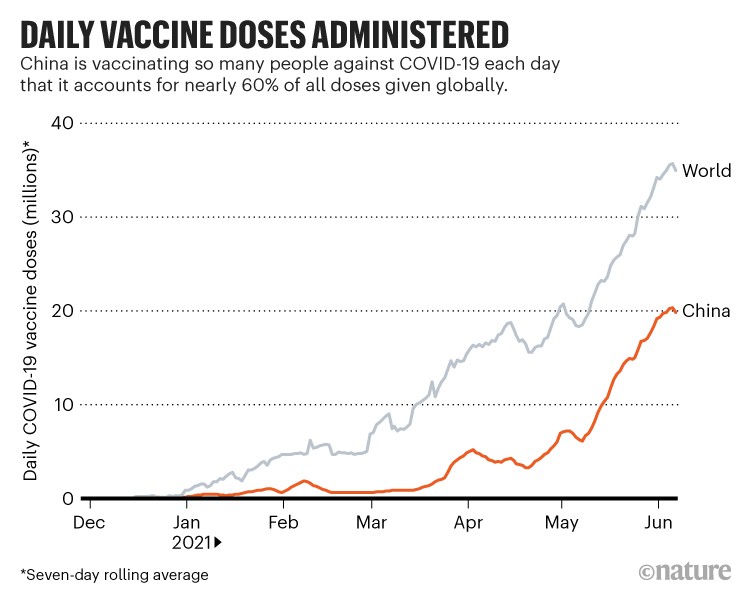China is vaccinating a staggering 20 million people a day
Scientists are impressed by China’s juggernaut of a vaccination drive, through which it is currently administering nearly 60% of all COVID-19 vaccine doses globally.
Smriti Mallapaty
For more than a week, an average of about 20 million people have been vaccinated against COVID-19 every day in China. At this rate, the nation would have fully vaccinated the entire UK population in little more than six days. China now accounts for more than half of the 35 million or so people around the world receiving a COVID-19 shot each day.
Zoltán Kis, a chemical engineer in the Future Vaccine Manufacturing Research Hub at Imperial College London, doesn’t know of “anything even close to those production scales” for a vaccine. “The manufacturing efforts required in China to reach this high production throughput are tremendous,” he says.
The majority of doses are of one of two vaccines, both of which have been approved for emergency use worldwide by the World Health Organization (WHO). CoronaVac — produced by Beijing-based company Sinovac — showed an efficacy of 51% against symptoms of COVID-19 in clinical trials, and much higher protection against severe disease and death. The second jab was developed in Beijing by state-owned firm Sinopharm and has demonstrated an efficacy of 79% against symptomatic disease and hospitalization.

Source: Our World in Data
Supplying vaccines to the world
China’s current vaccine production rate could potentially make a significant dent in global demand, says Kis; that would be “a huge step in reducing the health-care and economic burden of the COVID-19 pandemic”. China has already supplied 350 million doses of the twovaccines to more than 75 nations, and WHO approval should now trigger the further distribution of both vaccines to low-income countries.
“China’s vaccination campaign got off to a slow start, but has rapidly picked up pace,” says Rongjun Chen, a biomaterials scientist also at the Future Vaccine Manufacturing Research Hub. As recently as mid-April, China was administering only about five million doses a day.
According to an official at China’s National Health Commission, the nation aims to produce some three billion doses of COVID-19 vaccines in 2021 — and up to five billion per year after that.
To achieve such high production rates, many things need to go according to plan across the entire production and distribution chain, from sourcing raw materials to manufacturing active ingredients, filling vials and distributing doses to vaccination centres, says Kis. “It is crucial that everything arrives at the right location at the right time.”
A growing challenge
China’s production capacity is especially noteworthy given that both CoronaVac and the Sinopharm vaccine are made from inactivated virus. Scientists say that vaccines of this type require more time and effort to produce than do COVID-19 vaccines based on mRNA technology, such as the Pfizer or Moderna shots. To produce killed virus, manufacturers first need to grow it in living cells in large bioreactors, which can take months, explains Kis.
To achieve its massive gains, China probably leveraged its existing capacity for manufacturing inactivated-virus vaccines against other diseases, including influenza and hepatitis A, says Jin Dong-Yan, a virologist at the University of Hong Kong.
As of 6 June, China had administered 778 million doses to its population of about 1.4 billion people. At the current rate, it could fully vaccinate its whole population in around three months.
But it is unlikely to be able to maintain this pace, says Raina Macintyre, an epidemiologist at the University of New South Wales in Sydney, Australia. Most people vaccinated so far have been in cities, such as Beijing — where 87% of adults have received at least their first shot — but the job will get harder as the campaign fans out to rural areas and small villages, she says.
doi: https://doi.org/10.1038/d41586-021-01545-3
No comments:
Post a Comment